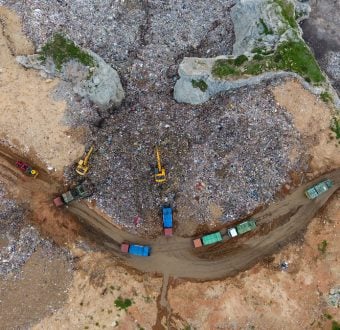In his opening statement to the United Nations General Assembly last Tuesday, President Jair Bolsonaro chose to continue distorting the narrative about the environmental and social crises in Brazil. During his 30-minute speech, Bolsonaro attacked three countries, relied on the theory of globalist conspiracy, attacked Indigenous Peoples, and used the platform to promote himself. He even claimed that, under his administration, Brazil had become a safer country — just a few days after the tragic murder of an eight-year-old child by police forces in Rio de Janeiro.
“Bolsonaro lied about the environment in his speech. The president tried to convince the world that he protects the Amazon, but instead, he has dismantled social and environmental protected areas, sold off Indigenous Peoples’ lands to foreign mining companies, and weakened forest crime enforcement. Under his administration, burning, deforestation, and violence have increased outrageously. For the forest and its people, Bolsonaro is a threat — not the solution,” said Marcio Astrini, Greenpeace Public Policy Coordinator.
“Bolsonaro was elected president; he does not own Brazil and has not been given the right to destroy the country. He distorts the concept of national sovereignty to justify his agenda of destruction of the Amazon. National sovereignty is not being able to do — or destroy — anything you want. Sovereignty means having a national responsibility to ensure the protection of Brazil’s greatest environmental heritage.”
Below, our colleagues at Greenpeace Brazil have highlighted some key lies and distortions from Bolsonaro’s UN address this week:
Bolsonaro stated his commitment to the environment and zero tolerance for environmental crime
- Between January and September, the Brazilian government only used 7.5 percent of its diminished resources to combat deforestation and associated crimes, such as land grabbing and violence against local communities. During the same period, there was a 28 percent reduction in the number of environmental evaluations throughout the country when compared to the same period in 2018. Without these inspections, organized crime works freely, and mafias that profit from forest destruction continue to endanger both the land and its people.
- With the 24 percent cut in IBAMA’s — the Brazilian Environmental Agency — monitoring and supervision budget, there is not enough money left to pay for the agency’s fixed expenses. As a result, 38 percent of the agency’s forest-fire prevention budget and control programs have been tabled. Brazil is losing its ability to monitor, inspect, and prevent environmental crimes.
- The budget for dealing with climate change has fallen to virtually zero. The 95 percent cut severely affects deforestation and burning programs, Brazil’s largest source of greenhouse gas emissions.
“The Amazon remains virtually untouched,” said Bolsonaro
- According to the National Institute for Space Research (INPE), the Amazon biome has already lost 19 percent of its original area.
- From January to August 2019, the number of deforestation alerts increased by 75 percent over the same period in 2018. Considering only August of 2019, Amazon deforestation alerts were 3 times higher and fire alerts increased by 196.4 percent (as compared to 2018).
- Scientists warn that the Amazon deforestation may be reaching a critical point where the forest may lose its ability to cover, leaving it to become a degraded savanna.
According to the president, the fires were the result of this year’s “weather conditions”
- There is little to no evidence supporting this claim. According to a study released by the Amazon Environmental Research Institute (IPAM), the number of consecutive days without rain in 2019 was lower than that in 2018.
- The increase in fires in 2019 is actually the result of an orchestrated movement, encouraged by Bolsonaro’s rhetoric and the dismantling of environmental policies and agencies.
- The existence of the so-called “Fire Day” this year, in which farmers and land grabbers in Pará planned coordinated fires on August 10, is clear evidence of anticipated impunity. Despite these plans being covered by the media prior to any action, the federal government took no precautionary measures to prevent destruction.
Bolsonaro’s attacks on the rights of Indigenous Peoples
- Bolsonaro has announced that he wants to open Indigenous Peoples’ lands to mining and industrial agriculture.
- Studies show that, in Brazil, deforestation levels are 11 times lower in areas of the Amazon rainforest where there are Indigenous lands than in other forest areas. The integrity of Indigenous Peoples’ rights is crucial for curbing deforestation and climate change.
- Despite the 1988 Brazilian Constitution — which ensures that Indigenous peoples have their social organization, customs, languages, beliefs, and traditions respected and recognizes the original right over the lands they occupy — Bolsonaro has said that he does not want to recognize any Indigenous Peoples’ lands and has called into question existing demarcated areas.
- Bolsonaro used his UN speech to attack revered Indigenous activist and 2020 Nobel Peace Prize nominee Chief Raoni by name.
To learn more, check out the environmental atrocities “collection” put forth by Bolsonaro and his environment minister, Ricardo Salles, since January: https://www.amazonfireandblood.org/


